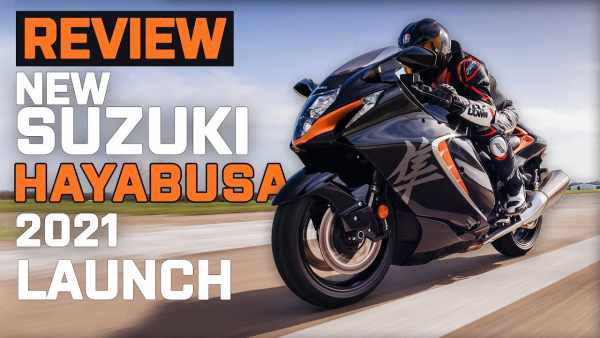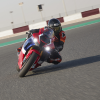
Visordown was on hand to sample the new 2021 Suzuki Hayabusa with a road ride and high-speed test on a runway
THERE are few names from the modern era of sports bikes that echo quite as loudly as the Suzuki Hayabusa. Introduced in a time when manufacturers were swinging wild punches at each other, the ‘Busa was designed to do one thing, and one thing only – go absolutely as fast as possible.
New Suzuki Hayabusa 2021 Video Review
And it did, so much so it managed to pull down the pants of Honda and Kawasaki, but it also did something much more. The Suzuki Hayabusa was a bike that helped to launch a kind of counter-culture within motorcycling, as it fuelled a wave of custom bike designers, stretched swingarms, and lurid paint schemes. It even made its way on screen as the star of the Biker Boyz film – think Fast and the Furious on two wheels…
And today on this chilly but bright spring morning, I’ve found myself dragged from my cozy pit and flung over to Sywell aerodrome for the launch of the 2021 version of this legend of a bike. We have a road ride planned for the morning, with the afternoon to be spent blatting up and down the aerodrome’s 1.2km runway. Right, where’s the coffee?!
2021 Suzuki Hayabusa Price and colours
At £16,499 the Suzuki is placed right in between two versions of Kawasaki’s boosted sports tourer. It’s slightly more expensive than the H2 SX base model (£15,899) and slightly less than the higher spec’d H2 SX SE, which comes in at £19,099.
Based on a £2,500 deposit and with 5,000 miles a year selected you’d be looking at 36 payments of £200.98 with a balloon payment of £8,972.
We are getting two colour options for the UK, the Glass Sparkle Black and Candy Burnt Gold you can see me riding here, and the Metallic Matt Sword Silver and Candy Daring Red bike. Now, I know what you’re thinking, the silvery-white version looks like a hairdresser's bike… give it a chance, I thought the same, but in the flesh, that matt finish looks very nice.
Engine
For the 2021 bike, Suzuki had considered a few new configurations of powerplant, including forced induction, larger layouts, and even six-cylinders – they even got to the stage of building prototypes. Eventually, though, the inline-four and 1340cc was settled upon, partly because it retained the bike’s all-important DNA, but actually, because for this type of bike, it is the best fit.
That’s not to say that there haven’t been changes though, as the new unit is significantly updated compared to the previous machines. The aim was to boost mid-range torque to improve the road riding experience. Yes, folks, that’s right: this bike is not going for all-out power domination. In fact, it’s slightly down on power when compared to the 2008 Gen’ 2. But as Pirelli famously said, ‘Power is nothing without control’, and anyway, isn’t 188bhp enough for the road? Peak torque is also down slightly, dropping from 113lb-ft to 110lb-ft, although good luck trying to notice that while you ride.
The gains made with the new bike are in the delivery, with Suzuki boosting more of the bike’s handy mid-range and low-end grunt. The result is a faultlessly smooth power and torque curve, with none of the usual troughs and low-points that are a tell-tale sign of a bike being whipped by the Euro emissions gods.
In practice, the Suzuki gets down the road like only a bike of this type can. It builds speed with delicious intent, turning the hedgerows and ditches into a blur with just a few degrees of throttle input. The fuelling is pitch-perfect, and the throttle connection so good, it almost feels like you’re reaching down into the engine and opening the butterflies by hand.
We couldn’t do any tank-to-tank MPG testing on the launch, but after 130-miles of fairly quick road riding under my belt, the Hayabusa’s fuel gauge was starting to nudge the red, although the bingo light had not yet illuminated. If you were planning a lengthy motorway hack, you should be okay for around 150-miles before wanting to fill the tank again.
Suzuki Hayabusa Suspension brakes and handling
I was a little surprised to see the Busa arrive with conventional, non-semi active suspension, although after riding the bike on the launch, I actually think it was a good call from the designers. The KYB setup has ample adjustability, and while I did find it a bit on the soft side on the launch, the level of adjustment on offer should allow any rider to tailor it just how they like it.
The launch bikes were set up for what felt like a more comfortable type of riding, soaking up bumps and potholes with a magic carpet-like ability. If you’re looking to go chasing apexes and scraping the pegs, a few minutes spent introducing in some pre-load and rebound damping support would probably be a wise move.
The braking set-up utilises Suzuki’s Motion Track Brake System – that’s cornering ABS to you and me. It is also a linked braking system, although I’m not sure you’ll ever notice it while riding. I’m not a fan of linked brakes that can be felt through the seat of your pants, and I’m happy to report that the input from the linked system on the new ‘Busa was totally imperceivable to me.
The four-pot Brembo calipers and 320mm discs up front have formidable power, with a nice chunky lever feel that allows you to take great bites out of a corner. The rear is a little vague, although on a bike of this size and weight it is kind of expected.
The big selling point of each of the three generations of the Suzuki Hayabusa was the way it handled. It was a point that none of the other bikes in the class could match. The ZZR1400 was more comfortable and a tad more refined, while the Super Blackbird was just more of a sensible option. The Hayabusa though was the closest you could get to a 1,000cc sports bike in terms of the way it handled out on the road.
For me, that’s still the way it is. The chassis and suspension gift the bike with beautiful mid-corner poise, and it seems to have an almost unflappable nature. You can barrel into a corner, way faster than you’d originally planned to, and just point the bike at the exit, dab the back brake, and away you go. It’s not like riding in a video game, like some 1,000cc sports bikes make it feel, and does require a fair bit of physical effort from the rider, but you do get the impression that this bike could haul you out of pretty much any situation.
Suzuki Hayabusa Comfort
Now, take my opinion on the comfort of the bike as subjective. I am completely aware that my Hobbit-like dimensions are at odds with the rest of the universe. But being totally honest, I didn’t find the new 2021 Suzuki Hayabusa all that comfortable. My five foot seven inch frame causes me to scooch down the seat towards the ample fuel tank, splaying my legs into some kind of advanced yoga position in the process. After the morning’s road riding was done and with just a couple of miles to ride back to Sywell, I was well and truly ready for a walkaround and leg stretch, and my wrists were just starting to ache.
Look, it’s not going to happen to everyone, and we had been out on the road for about four hours. In real-world continent crossing conditions (is that still a thing now?), you’ll probably only do two or maybe three hours before stopping, filling up, and having a walk, so it’s not the biggest problem on a bike like this.
Suzuki Hayabusa Equipment
I said at the top of the article, that power is nothing without and control, and this section covers off exactly what I was talking about. The new 2021 Suzuki Hayabusa is absolutely dripping with tech. the list of gadgets is noted below, but really all you need to know is how easy it is to flick through and change the settings if you were to buy one.
Yes, compared to some other 2021 bikes, the centrally mounted TFT is a little bit small, and that was something that worried me when I saw the amount of parameters you can twiddle with on the bike, but in practice, it’s actually not bad at all. The menus are all clearly laid out and even activating the special toys, (like the launch control that I inadvertently engaged right outside Corby police station - sorry not sorry) is easy enough for a luddite like myself.
The bike is also fitted with a very slick, up and down shifter and blipper as standard. Like the rest of the bike, it feels very solid, changing gear slickly and even working well at slower speeds.
2021 Suzuki Hayabusa electronics
Suzuki Drive Mode Selector Alpha (SDMS-α) featuring a selection of three factory preset and three user-definable modes, combining:
- Motion Track Traction Control System (10 modes plus off Power Mode Selector (three modes)
- Bi-directional Quick Shift System (two modes plus off)
- Anti-lift Control System (10 modes plus off)
- Engine Brake Control System (three modes plus off)
- Active Speed Limiter
- Launch Control System (three modes)
- Emergency Stop Signal
- Suzuki Easy Start System
- Low RPM Assist
- Cruise Control System
- Combined Brake System
- Motion Track Brake System
- Slope Dependent Control System
- Hill Hold Control System
What we liked about the 2021 Suzuki Hayabusa
- The engine, still a peach and maybe the last of a dying breed
- Handling that defies the logic of a bike of this size
- Front fairing works very well
What we didn’t
- Comfort is compromised
- Lack of engine braking and only the ability to reduce the effect
- Wristy riding position – again, my personal view
2021 Suzuki Hayabusa Verdict
After a day of riding on road and hitting an indicated 180mph on Sywell’s 1.2km runway, I was both exhilarated by the new 2021 Suzuki Hayabusa, but also a little sad at the same time. And the sad bit is not a negative on any front, I actually feel a little bit bad for Suzuki’s engineers. They’ve spent the last couple of years creating an absolute corker of a bike. One that I’m quite sure it’s better in every single way than the previous version. But bikers are weird creatures, we’re obsessed by outright power and torque, regardless of how difficult it is to achieve these figures in this environmentally obsessed world that we live in.
What Suzuki has done is build a bike that will be easier to live with day-to-day, easier to exploit on the road and in all conditions, and that’s safer to ride. If you are a fan of the previous Gen 1 and Gen 2 Hayabusa’s, give the new one a try, I’m fairly sure you won’t be able to spot where the missing ponies have bolted to.
For more information, head to: bikes.suzuki.co.uk

